QuestionQUESTION: I have a 1 yr old persian mixed cat and just took in a a Russian blue 5 weeks old. A friend works at a vet and someone brought in 3 kittens found and she brought home 3 cute grey russian blue kittens, and at 5 weeks old i took one. well, ive been noticeing that this kitten will growl, paw over food, and lay on food when she wants to eat the food, especially cat treats its bad. my persian mix lets the kitten eat treats and food first and then goes and eats. the kitten even bite my husband, when he tried to
remove the kitten from the treats. what do i do, will this kitten grow outta food aggression or will she do it all the time? she always has food, and how much should i feed this kitten ? a whole can of wet food or dry or will the kitten keep eating and then explode? please answer the best you can any help you can give would be great. thanks
ANSWER: Hi Karen,
Most kittens outgrow food aggression. As kittens, they practice all sorts of skills they may need to survive, and one is protection over their food. In the wild, aggressively protecting their food might mean the difference between life and death. In your household, the kitten will most likely learn that food is plentiful, just like your Persian has, and that protecting it so aggressively is a waste of energy. This may not be true of treats, however, which are not as bountiful. Cats who are greedy as kittens do tend to remain a bit greedy as adults when it comes to special foods that aren't available to them at all times. When it comes to food aggressive cats, it's best to feed them separately. It's good that your Persian mix will let her eat first, and if that works out fine with no confrontations, then there's no need to completely separate them. However, if fights break out, or one cat hogs all the food and the other cat starts to lose weight, you should have structured meal times, feeding the cats at the same time in two separate rooms. For treats, have two people feed the cats treats at the same time, or feed the cats treats in separate rooms. If the kitten snatches treats from your hand and accidentally bites or scratches, hold the treat in your closed fist, not fingers, and place the treat on the floor for the kitten.
For the most part, you can feed a kitten as much as she'll eat. They're growing, and their bodies will typically use everything they take in. Food labels will have general feeding instructions on them, so you can use those as guidelines, but if the kitten needs to eat a little more than is recommended, that's okay. Cut back on how much she's eating if she starts to become too fat, or if she eats so quickly that she vomits. Adult cats usually get two 5-oz. cans of food each day, but because kittens may need three times as much food as adults do per pound of body weight, your little kitten could very well need a full can of food or even more. Most people feel it's best to allow cats to have access to dry food at all times unless they're overweight or have special needs, but I would be careful with one this little. Her teeth are too little for most dry food. You might look into a food called Royal Canin's Babycat 34.
Best wishes!
Jessica
---------- FOLLOW-UP ----------
QUESTION: Jessica
Thanks for the excellent answer on my first question. I have another one know. About 2 weeks ago I found cat poop and cat pee in a box in my dining room, and can only assume it was the kitten, but I dont know now. Just yesterday i was cleaning my bed room and I found cat pee once again in a corne of the room where my husband keeps his shoes and of course there was cat pee in one of his shoes (they got thrown out). I dont know if its the kitten (which is a girl) or if its my male persian mix. I know that my male persian does like to sleep there, and i also notice that the kitten would always lay on his shoes and play in them. So I dont know if the kitten pee'd there or could it be my male cat claiming his territory. It also confuses me if he's claiming his territory cause they do get along and play. Ive also seen him grooming the kitten on more then one occasion. So I guess if he likes the kitten why would he pee to claim his territory? Will it EVER STOP !!!!!
AnswerWell, the kitten is very, very young, and I would almost bet some money that she is responsible for the accidents unless there are large volumes of urine or feces present. Of course, you can't blame her, since she only became able to control her bodily functions a week or two ago. Most kittens don't set foot in a litter box until the age of 4 or 5 weeks and aren't solidly using a litter box until around 7 or 8 weeks.
What I would suggest is that you isolate the kitten to a bathroom or a dog crate for a couple of weeks, with a litter box and her food and water, and see if any more accidents occur around the house. If not, you can be pretty sure that she was the one who had the accidents. Also, during this time, she'll have a chance to really form solid litter box habits, because in a confined space, she won't want to pee or poop next to her food or where she sleeps. She'll find the most appropriate place to go is in her litter box. You can let her out of confinement to play and cuddle, as long as you're going to be there to closely supervise and be sure no accidents happen. If she starts scratching or squatting on the carpet, quickly scoop her up and run her to a litter box.
Also, remember that you'll need to add a few litter boxes around the house until she's a little bit older, even after you let her out of confinement, because her bladder is so little. Once she's older and has better control, you can eliminate unnecessary boxes, but it's still recommended that households with two cats have three litter boxes, preferably in different areas.
If you find that accidents DO happen while she's confined, the problem can be a little more difficult to deal with. I would recommend that you use a product called Feliway, which can help reduce the need to mark territorially when a cat is feeling some anxiety. I use the plug-in diffusers in my own home at all times. See www.feliway.com to learn more.
A lot of the time, this marking resolves once a cat accepts the changes to the home, but not always. If the Feliway doesn't help, you might consider finding the kitten a new home before she gets any older, or you could talk to the vet about an antidepressant. Most cats don't require them for long. Treatment for a few months usually resolves the problem.
Remember to clean any accident areas with an enzymatic cleaner. The enzymes in these will break down the fats in cat waste, making it possible to remove the stain completely. Other cleaners just cover up the stain with fragrances, but the cat can still smell the original stain, and they'll continue to use the area as a litter box. A good enzymatic cleaner is Nature's Miracle, available at pet stores.
Good luck!
Jessica

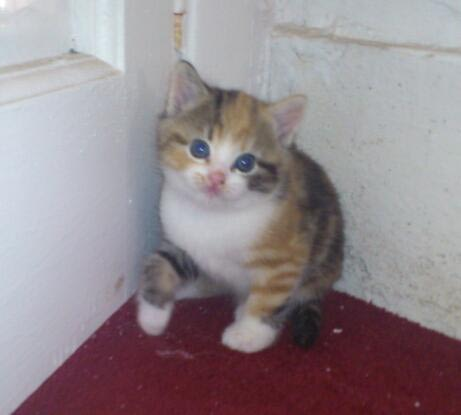 is my male kitten a tortoiseshell?
Question
our wee guy our wee guy
Hi,
I am
is my male kitten a tortoiseshell?
Question
our wee guy our wee guy
Hi,
I am
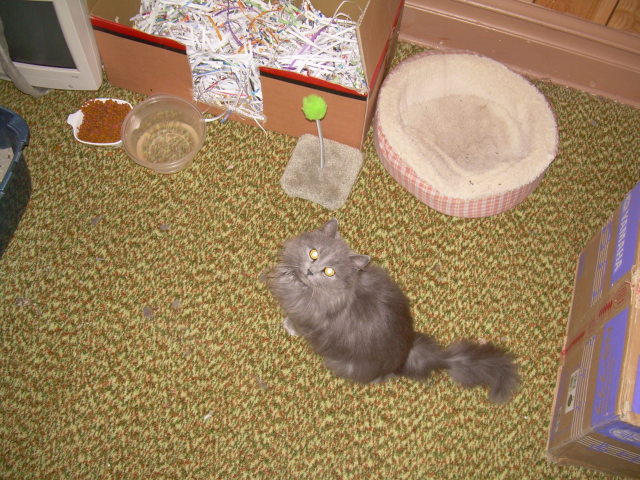 How pregnant is my cat
QuestionQUESTION: I was adopted by a local neighbor hoo
How pregnant is my cat
QuestionQUESTION: I was adopted by a local neighbor hoo
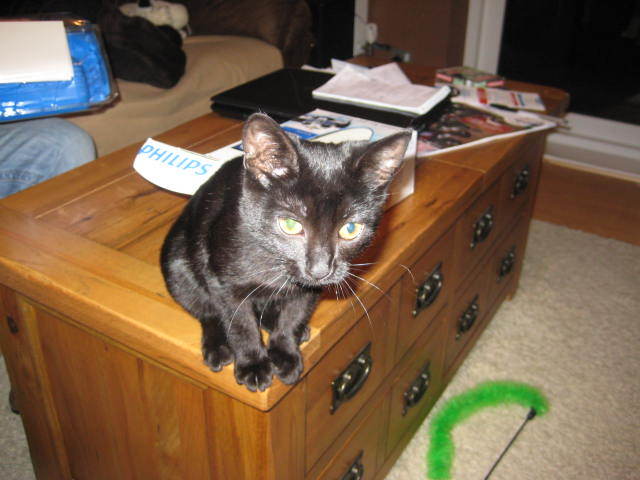 Cat in Heat with a little blood in her stool
Question
Millie Moo
Hi, I have a 5 month old female kit
Cat in Heat with a little blood in her stool
Question
Millie Moo
Hi, I have a 5 month old female kit
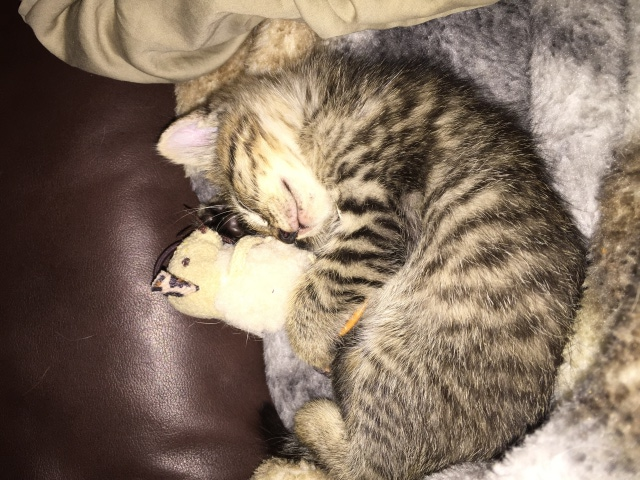 Found 4-5 week old kitten
Question
Chloe
Hi. We found a 4-5 week old kitte
Found 4-5 week old kitten
Question
Chloe
Hi. We found a 4-5 week old kitte
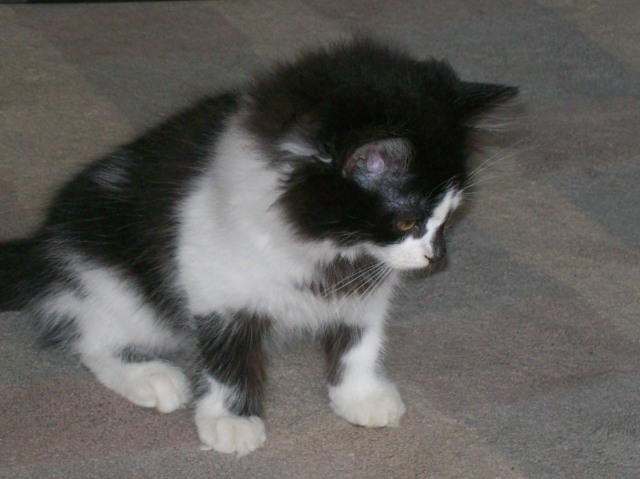 handling my 9 week ferel kitten
QuestionMillie
QUESTION: Hi. My lovely 9 week ki
handling my 9 week ferel kitten
QuestionMillie
QUESTION: Hi. My lovely 9 week ki